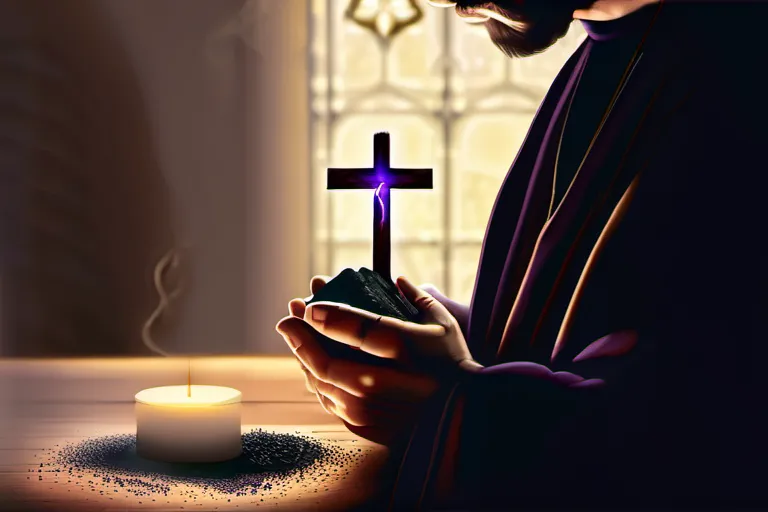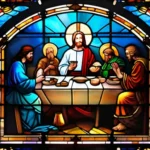Explore the history, symbolism, and importance of Ash Wednesday in Christian faith.
Ash Wednesday marks the beginning of Lent, a solemn season observed by many Christians worldwide. This article delves into the significance of this day, its origins, and its role in the Christian calendar.
The Origins of Ash Wednesday
The origins of Ash Wednesday are shrouded in layers of history, much like the first ash marks etched on believers’ foreheads on this day each year. Where did this practice begin? Some trace it back to the Bible itself, where we find that when Job’s friends came to console him after his terrible misfortune, they covered themselves with ashes and sat in silence, expressing their sorrow (Job 2:12). This act of covering oneself in ashes as a sign of mourning or repentance is one of the earliest recorded instances.
However, the specific tradition of distributing ash on Ash Wednesday can be traced to the early Christian communities. In the early days, were these marks only a symbol of grief or did they carry deeper spiritual meanings? Over time, this practice evolved, blending Jewish and pagan customs with Christian traditions, as the faith spread across the Roman Empire.
The symbolism of ashes on Ash Wednesday is rich and complex. In many early Christian communities, the act of being marked with ash was a public declaration of one’s mortality and a reminder to live in humility before God. It became a powerful emblem of repentance, a tangible sign that we are but dust, and to dust we shall return (Genesis 3:19). This practice served as a stark contrast to the materialistic and opulent world around them, serving as a humble reminder of the transient nature of life.
As the years passed, this tradition took root in Western Christianity. The ashes used on Ash Wednesday are made from the blessed palms used in the previous year’s Palm Sunday celebration. This reuse of materials symbolizes the continuity and connection between different seasons of the church calendar. By transforming the remnants into a means of spiritual renewal, Christians are reminded that our past can be transformed for the greater glory of God.
So as you step forward on Ash Wednesday to receive the sign of the cross made from ashes, are you ready to embrace this powerful symbol? Will it serve as a reminder not just of your mortality but also of the grace and mercy available through Christ? The history of Ash Wednesday invites us to reflect deeply on our own faith journeys, encouraging us to live in humility and seek forgiveness.
The journey from Job’s ashes to the rituals of Ash Wednesday is one of transformation and renewal. Each year, as we receive this mark of ashes, may it serve as a poignant reminder that we are not alone in our struggles and that through Christ, we find hope and redemption.
The Symbolism of Ashes
The significance of ashes on Ash Wednesday isn’t just about dusting our foreheads; it’s a profound act that echoes through centuries of Christian tradition. Have you ever wondered why ashes are such a powerful symbol in faith? In Christianity, ashes hold a rich symbolism deeply rooted in both the Old and New Testaments.
Imagine ashes as a physical representation of mortality—‘Remember that thou art dust, and to dust thou shalt return.’ (Genesis 3:19) This biblical verse paints a vivid picture of humanity’s fleeting existence. On Ash Wednesday, we are reminded that our lives are temporary, much like the ash left after a fire has burned out. It’s a humbling reminder to cherish every moment and use it wisely.
Ashes also symbolize repentance. In times of crisis or spiritual awakening, people often turn to fasting and penitence as a way to seek forgiveness and renewal. The act of placing ashes on our foreheads mirrors this tradition, serving as a silent plea for God’s mercy and grace.
Consider the metaphor of ‘a grain of sand in a shoe,’ which causes discomfort until it is removed. Similarly, our sins can be like burdens we carry daily, weighing us down emotionally and spiritually. Ash Wednesday encourages us to lay these burdens at the feet of Christ, seeking His help to carry them.
In this modern age, where technology often distracts from spiritual matters, the act of receiving ashes is a stark reminder of our spiritual obligations. It calls us to pause, reflect, and reconnect with our faith. As we place that ash on our foreheads, let’s ask ourselves: How can I be a better Christian today?
Through these symbolic acts, Ash Wednesday becomes more than just another day on the church calendar; it transforms into a powerful tool for spiritual growth and renewal. By embracing the symbolism of ashes, we can find new ways to deepen our faith and connect with the divine.
The Liturgy of Ash Wednesday
The liturgy of Ash Wednesday is more than just a ceremony; it’s a profound ritual that marks the beginning of Lent, a time for reflection and spiritual renewal. Have you ever wondered why the priest imposes ashes on our foreheads during this service? The act itself carries deep significance rooted in both tradition and symbolism.
Imagine yourself as a participant, standing before the priest with bated breath. As they dip their thumb into the urn of blessed ashes, they trace the sign of the cross upon your forehead, leaving an indelible mark. This simple gesture is not merely symbolic; it’s a powerful reminder of our mortality and the need for spiritual transformation.
The imposition of ashes serves as a tangible link to the early Christian practice of repentance. In ancient times, individuals would cover themselves with ash as a sign of their sorrow and remorse. Now, in Ash Wednesday services, we carry on this tradition, allowing the symbol of ash to be etched upon our foreheads like a seal of dedication.
But what does it mean when the priest says, ‘Remember that you are dust, and to dust you shall return’? These words echo the story of Adam in Genesis, reminding us of our place in the grand narrative of creation. The ashes serve as a reminder of our fragility and the need for divine grace.
So, why do we participate in this ritual? Is it merely an external act, or does it hold deeper spiritual significance? As believers, the imposition of ashes becomes a personal declaration that we are ready to embark on the journey of Lent. It’s a moment of introspection and a call to action, urging us to seek forgiveness, renewal, and closer communion with God.
The liturgy of Ash Wednesday is more than just a ritual; it’s an invitation to engage deeply with our faith. By embracing this act, we symbolically carry the weight of our past mistakes, acknowledging them as a part of our journey towards redemption. As you receive those ashes on your forehead, consider how they will serve as both a reminder and a guide throughout the season of Lent.
The Importance of Fasting on Ash Wednesday
Imagine stepping into a sanctuary where time seems to pause, and you find yourself face-to-face with the stark reality of your own mortality. That’s what Ash Wednesday feels like for many believers, as they mark their foreheads with ashes and reflect on the fleeting nature of life. Fasting, an integral part of this day, serves as a poignant reminder of sacrifice and self-denial.
Why do we fast on Ash Wednesday? It’s a practice steeped in tradition and deeply rooted in the teachings of Jesus Christ himself. In Luke 2:37, it’s written that “And a large crowd was with him,” but only those who fasted were chosen to follow him closely. This verse highlights the importance of fasting not just as a physical act, but as an opportunity for spiritual cleansing and introspection.
Fasting on Ash Wednesday is more than just abstaining from food; it’s a way to break free from the chains of materialism and consumerism that often blind us to our true selves. By giving up something we hold dear, like a favorite snack or meal, we acknowledge that there are greater things beyond our daily routines.
Consider this: why do we choose specific items to abstain from? This practice isn’t arbitrary; it’s deeply personal and reflective of what we believe is most important in our lives. For some, giving up social media might be the greatest sacrifice, freeing them from constant distractions. Others might find solace in fasting from sugar or caffeine, seeking a clearer mind for prayer.
The act of fasting on Ash Wednesday is like hitting the reset button on your spiritual journey. It’s a call to pause, reflect, and renew our commitment to God. As we stand in the silence of our chosen fast, we’re reminded that true fulfillment comes not from what we consume but from the depth of our relationship with God.
Fasting on Ash Wednesday is a powerful act of humility and service. It’s a reminder that in letting go of what we hold onto most, we can embrace a greater understanding of ourselves and our place in the world. So as you prepare to fast this Ash Wednesday, ask yourself: What am I willing to give up for God? The answer might surprise you.
Ash Wednesday in Different Christian Denominations
How do different Christian denominations approach Ash Wednesday, you might wonder? Is it a uniform ritual or does each group add its unique flavor to this solemn day?
- Catholicism: In the Catholic Church, Ash Wednesday is a full-fledged observance. Devotees gather in churches for special liturgies where they receive ashes on their foreheads, symbolizing mortality and penitence. The tradition of marking believers with ash highlights the importance of reflection and repentance at the beginning of Lent.
- Eastern Orthodox: While Ash Wednesday is not observed uniformly across all Eastern Orthodox churches, those that do observe it typically use olive oil instead of ashes to mark their foreheads. This practice adds a unique scent to the ritual, evoking the sense of smell in a way that deepens the spiritual experience.
- Pentecostal and Evangelical Christianity: In these denominations, Ash Wednesday is not commonly observed due to its association with Catholic traditions. However, some churches may still mark it as part of their Lenten practices or for those seeking a deeper sense of repentance and humility.
- Anglican Church: Here, Ash Wednesday can be seen as a time of reflection and preparation for the long journey of Lent. The use of ashes is often combined with a reading from The Book of Common Prayer, providing a meaningful context to this ritualistic practice.
Each denomination brings its own interpretation and traditions, much like how flavors blend in a rich soup. Whether it’s the symbolic marking of the forehead or the quiet reflection during worship, Ash Wednesday serves as a reminder that despite our differences, we all share the common thread of seeking spiritual growth and renewal.
The Impact of Ash Wednesday on Personal Spirituality
Imagine stepping into a quiet church on Ash Wednesday, the stark lines of the sanctuary almost as cold and sobering as the ash traced on your forehead. The act of receiving that smudge of ashes is not just a symbolic gesture but a profound personal journey. How does this simple ritual impact one’s spiritual life? What are the hidden depths behind this custom?
Ash Wednesday marks the beginning of Lent, a season of reflection and penitence before Easter. It serves as a reminder that we are dust, and to dust we shall return—a poignant thought indeed! But why is it so significant for Christians? Could it be that this ritual speaks directly to our own mortality, urging us to confront our inner selves with honesty and humility?
For many, the act of receiving ashes is a call to action. It’s a chance to pause, reflect on personal shortcomings, and seek a deeper relationship with God. The ash serves as a metaphor for the weight of our sins, but also for the grace that can cleanse us of these burdens. This tangible symbol of mortality becomes a powerful tool in introspection, serving as a reminder that our lives are fleeting and that true fulfillment lies not just in earthly achievements but in spiritual growth.
Moreover, Ash Wednesday is more than an individual experience; it’s a communal one. The act of receiving ashes together with the congregation can foster a sense of unity and shared purpose. It’s like being part of a larger tapestry, each thread representing a soul on this journey towards redemption. How does it feel to be connected in such a profound way? Is there something about sharing this moment that makes it more meaningful?
The impact of Ash Wednesday on personal spirituality is multifaceted. It can be seen as a time for introspection, a period for setting intentions, and an invitation to transform one’s life through faith. As you receive the ashes, do you feel a weight lifting or perhaps a new resolve forming? Is there a story behind these acts of penitence that speaks uniquely to your heart?
Ultimately, Ash Wednesday is not just about marking time but about making a commitment. It’s an opportunity to renew our vows with God and to embrace the journey ahead. As you move through this season, how do you plan to engage with its teachings? Will you find new ways to apply them in your daily life?
Conclusion
 Understanding Ash Wednesday deepens our appreciation for the Christian faith and its practices. By participating in this tradition, we can grow closer to God and reflect on our own mortality.
Understanding Ash Wednesday deepens our appreciation for the Christian faith and its practices. By participating in this tradition, we can grow closer to God and reflect on our own mortality.











